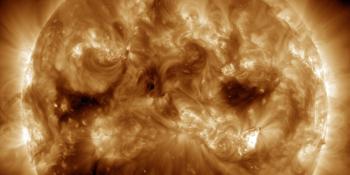Viewing archive of Saturday, 28 May 2011
Solar activity report
Any mentioned solar flare in this report has a scaling factor applied by the Space Weather Prediction Center (SWPC). Because of the SWPC scaling factor, solar flares are reported as 42% smaller than for the science quality data. The scaling factor has been removed from our archived solar flare data to reflect the true physical units.
Report of Solar-Geophysical Activity 2011 May 28 2200 UTCPrepared by the NOAA © SWPC and processed by SpaceWeatherLive.com
Joint USAF/NOAA Report of Solar and Geophysical Activity
SDF Number 148 Issued at 2200Z on 28 May 2011IA. Analysis of Solar Active Regions and Activity from 27-2100Z to 28-2100Z Solar activity was low. Region 1226 (S19E65) produced
the majority of the flare activity, including a C8 x-ray event at
28/0331Z. The region grew rapidly in size, spot count and
complexity over the past 24 hours, ending the period as an Eai spot
group with Beta-Gamma magnetic characteristics. Region 1224
(N20W28), a Dso class group with Beta magnetic characteristics, also
grew over the past 24 hours.
IB. Solar Activity Forecast
Solar activity is likely to remain low
for the next three days (29-31 May) with a slight chance for an
M-class event.
IIA. Geophysical Activity Summary 27-2100Z to 28-2100Z
Geomagnetic field activity ranged from unsettled to major storm
levels over the past 24 hours. The ACE spacecraft observed the Bz
component of the interplanetary magnetic field turned southward
(negative) at approximately 25/0530Z. The field generally ranged
from -5 nT to -12 nT between 27/2130Z to 28/1230Z. The prolonged
southward Bz resulted in substantial geomagnetic disruption and was
attributed to the arrival of a coronal hole high speed stream
possibly coupled with effects from the 25 May filament eruption.
Solar wind speed rose above 500 km/s after 28/0530Z.
IIB. Geophysical Activity Forecast
The geomagnetic field is
expected to remain at unsettled to active levels, with isolated
minor storm periods, on days 1 and 2 (29-30 May), becoming
predominantly unsettled on day 3 (31 May). This activity is in
response to the continued influence of the coronal hole high speed
stream.
III. Event Probabilities 29 May to 31 May
| Class M | 15% | 15% | 15% |
| Class X | 01% | 01% | 01% |
| Proton | 01% | 01% | 01% |
| PCAF | green | ||
IV. Penticton 10.7 cm Flux
Observed 28 May 101 Predicted 29 May-31 May 100/100/100 90 Day Mean 28 May 108
V. Geomagnetic A Indices
Observed Afr/Ap 27 May 007/011 Estimated Afr/Ap 28 May 032/035 Predicted Afr/Ap 29 May-31 May 020/020-015/015-010/010
VI. Geomagnetic Activity Probabilities 29 May to 31 May
| A. Middle Latitudes | |||
|---|---|---|---|
| Active | 20% | 20% | 15% |
| Minor storm | 20% | 15% | 05% |
| Major-severe storm | 10% | 05% | 01% |
| B. High Latitudes | |||
|---|---|---|---|
| Active | 30% | 30% | 20% |
| Minor storm | 25% | 20% | 10% |
| Major-severe storm | 15% | 10% | 05% |
All times in UTC
Latest news
Latest forum messages
AR4048 64Interacting with Cactus 2AR4046 146Temporary Topic - Ongoing Solar Proton Events 6Similar AR 3664 vs AR 4048 ??? 10
More topicsSupport SpaceWeatherLive.com!
A lot of people come to SpaceWeatherLive to follow the Sun's activity or if there is aurora to be seen, but with more traffic comes higher server costs. Consider a donation if you enjoy SpaceWeatherLive so we can keep the website online!

Space weather facts
| Last X-flare | 2025/03/28 | X1.1 |
| Last M-flare | 2025/04/01 | M5.6 |
| Last geomagnetic storm | 2025/03/27 | Kp5 (G1) |
| Spotless days | |
|---|---|
| Last spotless day | 2022/06/08 |
| Monthly mean Sunspot Number | |
|---|---|
| February 2025 | 154.6 +17.6 |
| Last 30 days | 128.5 -22.7 |


